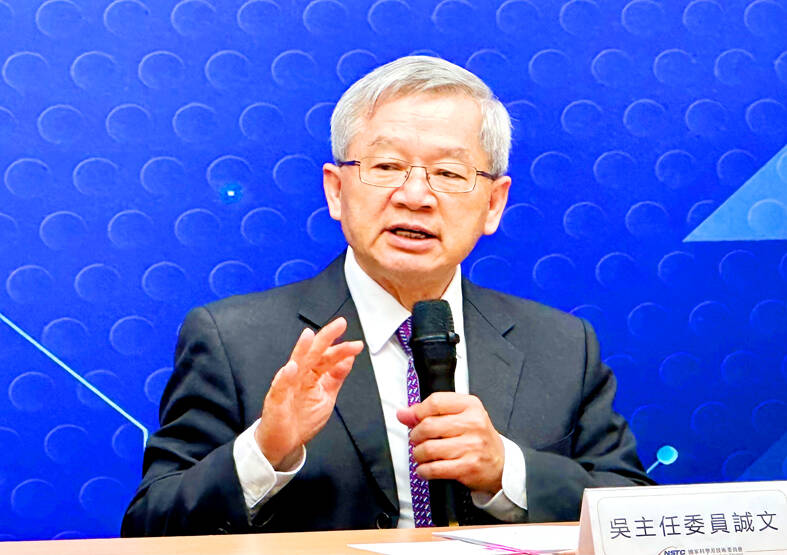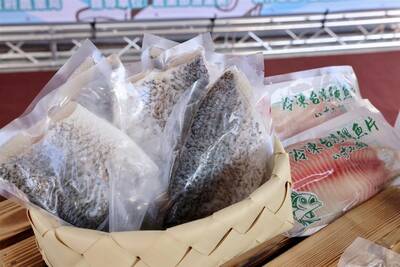Taiwan’s semiconductor ecosystem is “irreplaceable,” even though the US-China tech dispute might escalate, a National Science and Technology Council (NSTC) executive said yesterday, adding the council has proposed a record-high annual budget of NT$159.6 billion for next year to bolster the nation’s technological development.
Taiwan’s semiconductor industry ecosystem, which was first developed about 40 years ago, is “irreplaceable and not easy to replicate,” said NSTC Deputy Minister Su Chen-kang (蘇振綱) yesterday, who oversaw the Southern Taiwan Science Park (南部科學園區) achieve an output of more than NT$1 trillion (US$30.67 billion) for three consecutive years during his term as the science park’s director-general.
Cutting-edge industries and influential global companies would continue to invest in Taiwan and the nation’s science parks would continue to expand to meet the substantial industrial needs, he said.

Photo :CNA
Su told reporters that he would rather not speak on behalf of the NSTC, when asked about former US president and Republican Party presidential candidate Donald Trump’s comments that Taiwan “should pay” the US for protecting Taiwan’s chip business.
Trump’s comments have caused concerns that his victory in November’s US presidential election could exacerbate the US-China tech dispute, affecting Taiwanese vendors’ investments or restricting US vendors’ access to Taiwan.
However, Su said the Taiwanese government is dedicated to constructing an investor-friendly environment to attract global vendors to invest in new plants in the science parks and bring about benefits for the sector.
Although the semiconductor stocks plummeted yesterday, Su said that Taiwan’s comprehensive semiconductor ecosystem still has a relative advantage regarding the medium to long-term industrial development.
While Taiwan plays a key role in AI development, digital transformation and net zero transformation, NSTC would continue to reinforce its science parks to support the nation’s industries, he said, adding that the government is planning to establish overseas science parks as well.
Meanwhile, the council on Wednesday proposed a record-high annual budget of NT$159.6 billion for next year to bolster the nation’s technological development.
The NSTC made public the budget agreed by its committee (comprised of eight ministerial-level heads, academics and industry representatives), which totaled NT$159.6 billion. This represented a 15 percent rise from last year and a 1.6 percent increase from this year.
NSTC Minister Wu Cheng-wen (吳誠文) said the budget is intended to implement what President William Lai (賴清德) envisioned in his inaugural speech, namely transforming Taiwan into an artificial intelligence island.
Wu said that helping industries make digital and net-zero transitions, balancing the country’s development, strengthening communication resilience and developing smart medical services are among the focuses of the AI-centered plan.
“The aim is to solve social problems and provide social needs with new technologies, based on Taiwan’s comparative advantages in semiconductor and information and communication technologies,” NSTC Office of Science and Technology Policy Executive Secretary Yang Chia-lin (楊佳玲) said.
In addition to the “five trusted industry sectors” underlined by Lai — semiconductors, AI, military, security and surveillance, and next-generation communications (6G and communication satellites) — Yang said that other areas that would receive heavy investment include net-zero technologies, small and medium-sized enterprises and startups, and smart health.
The rough budget allocation — for certain key sectors — is NT$20 billion for semiconductors, NT$10 billion for AI, NT$9 billion for space and communications, and about NT$12 billion for net-zero technologies, Yang said, adding that these figures do not include investment in foundational research conducted by academia.
The budget proposal still has to be approved by the Executive Yuan.

Taiwan's Vice President Hsiao Bi-khim (蕭美琴) said Saturday that she would not be intimidated by the Chinese Communist Party (CCP), following reports that Chinese agents planned to ram her car during a visit to the Czech Republic last year. "I had a great visit to Prague & thank the Czech authorities for their hospitality & ensuring my safety," Hsiao said on social media platform X. "The CCP's unlawful activities will NOT intimidate me from voicing Taiwan's interests in the international community," she wrote. Hsiao visited the Czech Republic on March 18 last year as vice president-elect and met with Czech Senate leadership, including

There have been clear signs of Chinese Communist Party (CCP) attempts to interfere in the nationwide recall vote on July 26 in support of Chinese Nationalist Party (KMT) legislators facing recall, an unnamed government official said, warning about possible further actions. The CCP is actively involved in Taiwanese politics, and interference in the recall vote is to be expected, with multiple Chinese state media and TAO attempts to discredit the Democratic Progressive Party (DPP) and undermine public support of their recall movement, the official said. This interference includes a smear campaign initiated this month by a pro-Beijing Hong Kong news outlet against

A week-long exhibition on modern Tibetan history and the Dalai Lama’s global advocacy opened yesterday in Taipei, featuring quotes and artworks highlighting human rights and China’s ongoing repression of Tibetans, Hong Kongers and Uighurs. The exhibition, the first organized by the Human Rights Network for Tibet and Taiwan (HRNTT), is titled “From the Snowy Ridges to the Ocean of Wisdom.” “It would be impossible for Tibetans inside Tibet to hold an exhibition like this — we can do it. because we live in a free and democratic country,” HRNTT secretary-general Tashi Tsering said. Tashi Tsering, a Taiwan-based Tibetan who has never

A first shipment of five tons of Taiwan tilapia was sent from Tainan to Singapore on Wednesday, following an order valued at NT$600,000 (US$20,500) placed with a company in the city. The products, including frozen whole fish and pre- cooked fish belly, were dispatched from Jiangjun Fishing Harbor, where a new aquatic processing and logistics center is under construction. At the launch, Tainan Mayor Huang Wei-che (黃偉哲) called the move a “breakthrough,” marking Taiwan’s expansion into the Singaporean tilapia market. Taiwan’s tilapia exports have traditionally focused on the United States, Canada, and the Middle East, Huang said, adding that the new foothold in